The Internet remains an environment where it is important to keep your wits. The recent indictment of nine individuals on stock fraud charges reminds us that the pump and dump scam continues to be perpetrated [1][2]. Stock spam emails were particularly prevalent during the mid-2000’s, with these messages reportedly comprising 15% of all spam in 2006 [3]. These messages sought to artificially increase demand for infrequently traded stocks so that fraudsters could unload cheaply bought shares at a profit to unsuspecting investors.
In 2007, the U.S. Securities and Exchange Commission cracked down on these stock spam messages, acting to suspend the trading of companies touted in spam campaigns [4]. The jail terms of up to 4 years and fines of a quarter of a million dollars handed down to a gang led by convicted spammer, Alan Ralsky, sent a strong message to potential fraudsters that these scams were not tolerated [5]. However, stock spam emails continue to be sent.
This message from 2009 that we found in our historical spam email collection advertises one of the stock symbols mentioned in the indictment, RSGR [2]. It was possibly sent by someone associated with the parties named in the indictment.
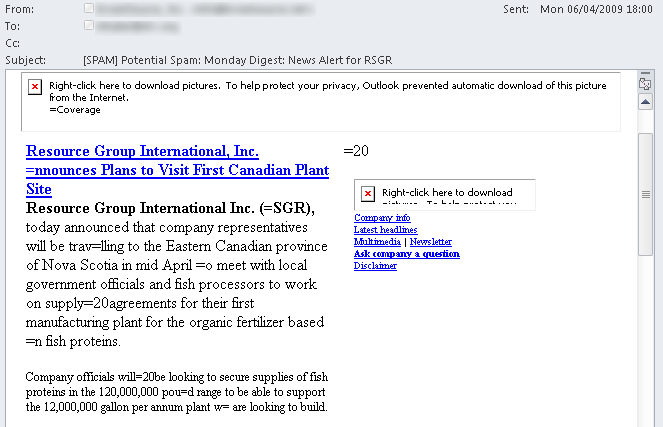
Taking one of the stocks cited in the recent indictment as an example, the pattern of share trades and price shows how the pump and dump scam unfolds. WGI Holdings inc. (WGIH) has been described as a “file cabinet business” with “minimal assets, [that] were thinly traded, and were owned or controlled by the defendants” [2].
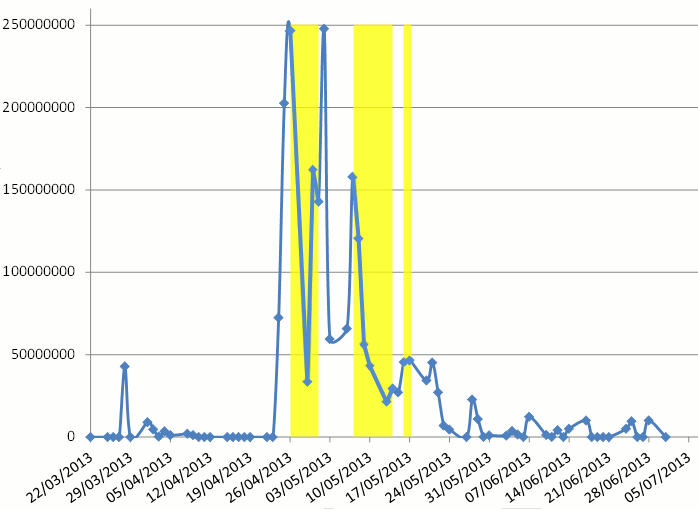
The y-axis shows the volume of shares being traded on the date shown on the x-axis. The yellow areas indicates the days on which the shares were being traded at the price $0.0002; at all other times the price was $0.0001 [6][7].
The cycle commences on 28 March with a purchase of 42.8 million shares at $0.0001. The indictment cites that stocks were promoted by the use of call centers, incentive payments to brokers and forum posts; we have no evidence that this stock was promoted by spam. At the end of April we do find evidence of a campaign of promotion on penny stock investor forums and on Twitter. However, in the frenzy of excitement generated by the increase in trading volume, it’s unclear which posts and tweets are made by those in on the scam and which are made by honest traders.
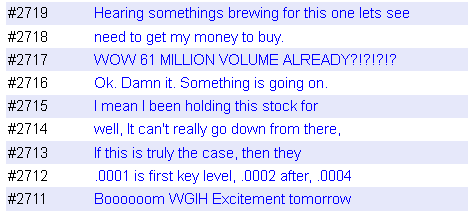
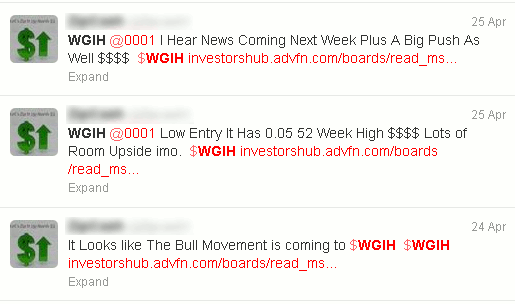
This generated a wave of interest in the stock, which was capitalized upon with a press release published on 26 April announcing a change in the share capital that may revalue the shares from the trading price of $0.0001 to $0.03 – $0.05. “the potential value is the three to five cent range in shareholder value, significantly undervaluing the Company’s stock at today’s prices” [8]. As the demand for the shares increased so did the price; the fraudsters certainly sold at the peak of promotion. Subsequently the demand and share price dropped, leaving posters on the forum to lament that they’ve been scammed.
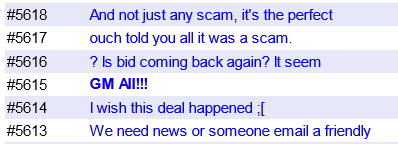
While there is still money to be made in these scams, the activity will almost certainly continue. Organizations need to be vigilant to ensure that spam emails promoting penny stocks are blocked before they can be delivered to recipients. Organizations should also consider blocking access to anything but the most reputable online trading websites at work to prevent individuals becoming caught up in the excitement of a fraudulently hyped stock.
The SEC’s advice to investors is clear when it comes to promoters claiming to have inside information on stocks and spreading these claims by email, on social media or bulletin boards: “The smartest play is the easiest. Just hit the delete key.”
References.
[1] “Remarks as Prepared for Delivery by Special Agent in Charge April Brooks on Nine Individuals Arrested and Indicted in One of the Largest International Penny Stock Frauds and Advance Fee Schemes in History”, FBI Press Release, 13 August 2013.
http://www.fbi.gov/newyork/press-releases/2013/remarks-as-prepared-for-delivery-by-special-agent-in-charge-april-brooks-on-nine-individuals-arrested-and-indicted-in-one-of-the-largest-international-penny-stock-frauds-and-advance-fee-schemes-in-history
[2] “U.S. Arrests Seven in $140 Million Penny Stock Fraud Case”, Bloomberg, 13 August 2013.
http://www.bloomberg.com/news/2013-08-13/u-s-arrests-two-in-140-million-penny-stock-fraud-case.html
[3] Frieder L & Zittrain J, “Spam Works: Evidence from Stock Touts and Corresponding Market Activity” (March 14, 2007). Berkman Center Research Publication No. 2006-11; Harvard Public Law Working Paper No. 135; Oxford Legal Studies Research Paper No. 43/2006. http://dx.doi.org/10.2139/ssrn.920553
[4] “SEC Suspends Trading Of 35 Companies Touted In Spam Email Campaigns”, SEC Press Release, 8 March 2007.
http://www.sec.gov/news/press/2007/2007-34.htm
[5] “Detroit Spammer and Three Co-Conspirators Sentenced for Multi-Million Dollar E-Mail Stock Fraud Scheme”, Department of Justice Press Release, 23 November 2009.
http://www.justice.gov/opa/pr/2009/November/09-crm-1275.html
[6] WGI Holdings Inc, share price data and volume data from Reuters.
http://www.reuters.com/finance/stocks/chart?symbol=WGIH.PK
[7] WGI Holdings Inc, share price and volume data from Yahoo!
http://uk.finance.yahoo.com/q/hp?s=WGIH&b=1&a=00&c=2013&e=1&d=06&f=2013&g=d
[8] “WGI Holdings, Inc. Reduces the Amount of Shares Issued and Outstanding by Over 88%”, reported by Marketwired, 26 April 2013.
http://m.yahoo.com/w/legobpengine/finance/news/wgi-holdings-inc-reduces-amount-145800388.html?.intl=us&.lang=en-us
[9] “Investor Alert—Don’t Trade on Pump-And-Dump Stock Emails”, US Securities and Exchange Commission Investor Alert, 12 June 2013.
http://www.sec.gov/investor/alerts/ia_pumpanddump.htm
Thanks to Henry Stern for contributing to this post.


CONNECT WITH US